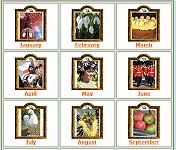
Folklore Calendar
stories, sayings, customs

Facts about July Gemstone: Ruby |
|||||||||||||||||||||||||||||||||||
|
July is one of the hottest months of the year. It is nearly the end of the school year and summer holidays are near. July is the seventh month of the year according to the Gregorian calendar. It was the fifth month in the early calendar of the ancient Romans. The Romans called the month Quintilius, which means fifth. A Roman Senate renamed the month to Julius (July) in honour of Julius Caesar, who was born on 12 July. The Anglo-Saxon names for the month included Heymonath or Maed monath, referring respectively to haymaking and the flowering of meadows.
July is the month when circular flattened patches begin to appear in fields of standing corn.
This phenomenon dates from early 1970s, although there are isolated earlier examples.
Takes place during the first week of July on a stretch of the River Thames at Henley-on-Thames in Oxfordshire. The Regatta began in 1839 with a single afternoon of rowing races and now lasts for five days.
The census of swans takes place annually during July on the River Thames in a ceremony known as Swan Upping. Swans are counted and marked on a 70 mile, five day journey up the River Thames.
St Swithin's Day is 15 July, a day on which people watch the weather for tradition says that whatever the weather is like on St. Swithin's Day, it will continue so for the next forty days.
This three day fair begins on the first Tuesday after 19 July. The town crier officially opens the fair by parading down the High Street with a golden glove at the end of a long pole decorated with garlands of flowers and announcing:
After this ceremony, hot pennies are thrown to the onlookers from the windows of various pubs and scrambles for by local children. The custom dates back many years to the days long gone when the wealthy of the town would 'aid' the poor.
Children used to make grottoes and caves and decorate them with sea shells because the scallop shell is supposed to be the emblem of St. James. The grottoes were placed outside the homes and the children would sit by them and say:
Whitstable Bay, on the north Kent coast, is famous for its oysters. It has been associated with oysters for hundreds of years. An old Kentish tradition says that Julius Caesar was drawn to Britain by the Whitstable oysters. On St. James's Day the locals hold an annual oyster festival, an event dating back to at least the early 19th century when it was the custom for fishers and dredgers to celebrate with an annual ceremony of thanksgiving.
Jan | Feb | Mar | Apr | May | Jun | Jul | Aug | Sept | Oct | Nov | Dec
|
|||||||||||||||||||||||||||||||||||
 © Copyright - please read © Copyright - please read All the materials on these pages are free for homework and classroom use only. You may not redistribute, sell or place the content of this page on any other website or blog without written permission from the Mandy Barrow. |
© Copyright Mandy Barrow 2013
Mandy is the creator of the Woodlands Resources section of the Woodlands Junior website.
The two websites projectbritain.com and primaryhomeworkhelp.co.uk are the new homes for the Woodlands Resources.
Mandy left Woodlands in 2003 to work in Kent schools as an ICT Consulatant.
She now teaches computers at The Granville School and St. John's Primary School in Sevenoaks Kent.
Woodlands Junior Homework Help new website






 25 July is St James' Day (Also known as Grotto Day )
25 July is St James' Day (Also known as Grotto Day )  The English Oyster season officially begins on St James' Day.
The English Oyster season officially begins on St James' Day.




